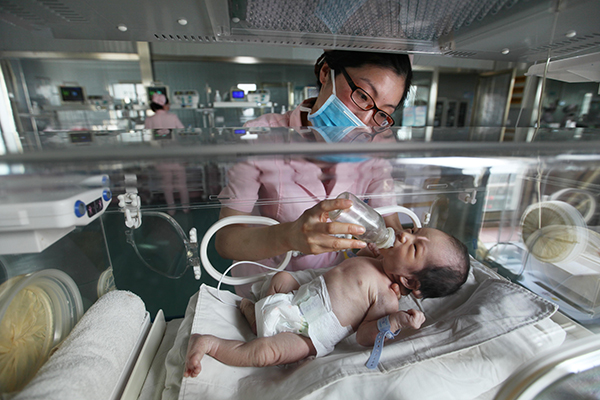
A newborn is cared for in an incubator. Maternity units such as this at Lianyungang, Jiangsu province, are experiencing a big increase in the number of births, and experts expect an even greater rise in the years ahead.[Photo by Si Wei/Chinadaily]
A new peak in births is likely to occur as a result of the relaxing of the family planning policy and could continue for several years, according to experts.
They estimate that the number of babies born annually will rise by more than 1 million from current levels, bringing the total number of births each year close to that recorded during the last peak.
Last year, 16.87 million babies were born in China, 470,000 more than in 2013, according to the National Bureau of Statistics.
“This is a dramatic increase compared with previous years,” Yuan Xin, a professor of population studies at Nankai University in Tianjin, said.
The number of births declined steadily between 1999, when more than 18 million babies were born, and 2006.
Since then, the number of births has remained stable at less than 16.4 million, according to the bureau.
The big increase in the number of births last year was caused by a series of moves to relax the family planning restrictions, Yuan said.
Since late 2013, 29 of the 31 provincial regions on the mainland have enacted policies that allow couples to have a second baby if either partner is a single child, according to the National Health and Family Planning Commission.
About 1.07 million such couples had registered with the authorities to have a second child by the end of last year, the commission said.
Couples have been allowed to have a second baby across China since 2011 if both partners have no siblings, a policy adopted by most provinces in the late 1990s.
Before that, almost all couples in urban areas were allowed to have only one child following the introduction of the family planning policy in the 1970s.
Couples in rural areas were allowed to have a second child if the first one was a girl.
Zhai Zhenwu, head of the China Population Association, said the extra births expected this year could mean the total may reach, or even exceed, 18 million.
Further relaxations of the policy are expected, and this means the peak may continue for five to eight years, he said.
According to the population authorities, about 6.6 million couples where one partner is an only child intend to apply to have a second child.
This could lead to an extra 1.2 million additional babies being born each year, assuming all the couples have babies over the next five or six years, Yuan said.
“Such a population increase will not have a big impact on society,” he added.
The number of women in the right age range to give birth is decreasing rapidly, and this means the population will not see a big increase even if more relaxations, such as allowing all couples to have a second child, are introduced.
“More relaxed policies can only delay China entering a stage when its population starts to decrease,” Yuan said.
“China will be a rapidly aging society until 2050.”
The number of people aged 60 or over will account for a third of the total population by that year, he said.
“Relaxation of family planning policies can improve family structures in the country, but it will not ease the problems caused by an aging population in the near future.
“The government should learn from the experiences of some developed countries in tackling aging populations and try to avoid problems they have faced.”
